
Remove the Lock Screen Fingerprint Of Your Motorola Moto G23

Remove the Lock Screen Fingerprint Of Your Motorola Moto G23
Users of Android phones can benefit from data and file protection tools like passwords, patterns, and PINs. But there are also some significant disadvantages, for example:
- Someone may have repeatedly entered the wrong password to access your phone.
- You may have forgotten the PIN on your device, pattern, or PIN.
- The lock screen fingerprint can also malfunction if there are repeated tries from an unauthorized finger.
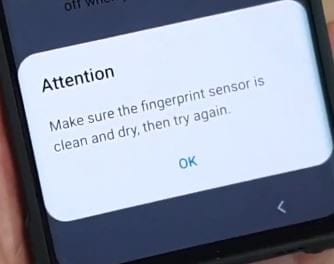
If you use a wrong password or a fingerprint unlock, it can permanently lock your Android device.
We can use many practical methods to remove the Android phone lock screen fingerprint. For example:
According to you, the most typical or initial option must be factory reset. However, when you try the factory reset method, you will lose all data on your phone. So, can you unlock an Android phone without a factory reset? Yes, we will tell you how to unlock your phone without fingerprint and resetting your Android phone.
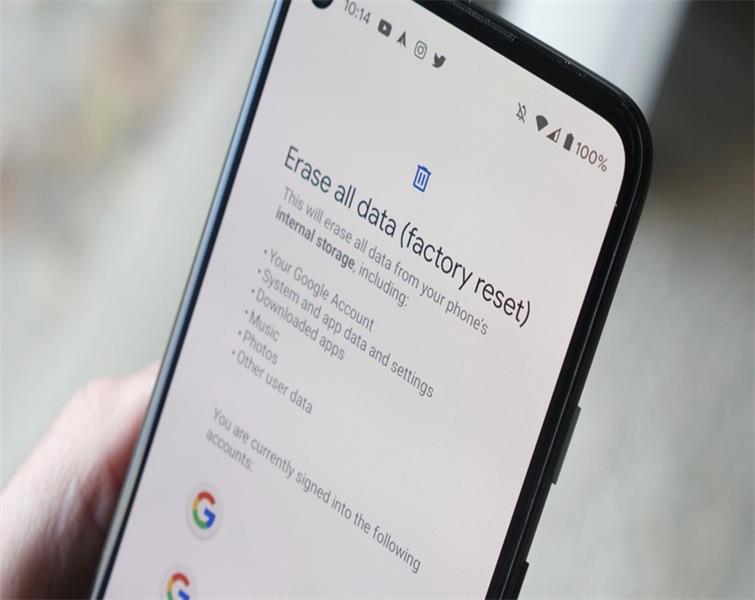
Follow these methods to bypass the fingerprint lock without resetting the phone. It will save you from losing your data. All our methods are very easy and safe.
Useful Methods to Bypass Fingerprint Lock
1. Restart your Phone
If your fingerprint is not working or the Motorola Moto G23 device prompts you with an error in the fingerprint functioning, possibly the fingerprint reader is not responding, and the Motorola Moto G23 device needs to restart to get rid of this error.
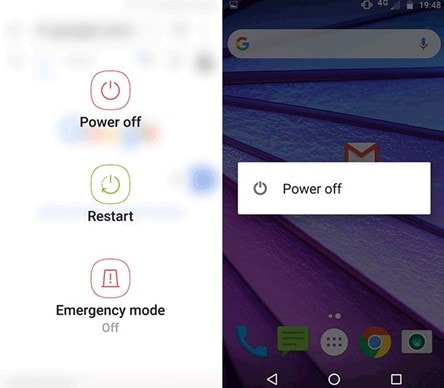
When a device restarts, the fingerprint functionality is restored after entering the Motorola Moto G23 device pattern, password, or PIN. This is the simplest method to reset your fingerprint hardware.
2. Remove your phone battery
Old android phones have removable batteries. If you can remove your phone battery, remove it and then put it back. Now turn on your phone. Doing so can help solve the fingerprint lock issue if there are bugs or system errors.
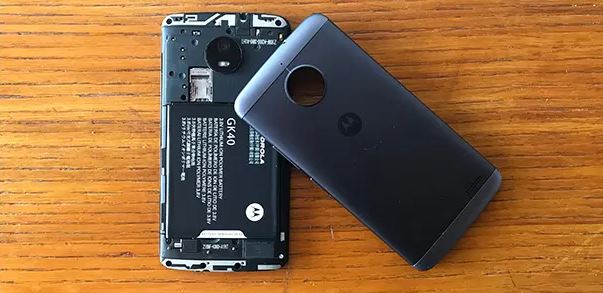
3. Dr.Fone - Screen Unlock
On Android handsets, you can attempt Dr.Fone to remove the fingerprint without professional skills. It allows you to delete the password, PIN, pattern, and fingerprint from an Android phone.
Step 1: Connect your Android device.
Open Dr.Fone on your PC, then among all the tools, choose “Screen Unlock.”

Step 2: Select a device type.
We are in this part to provide you with two ways to unlock practically any Android handset, including those made by Samsung, Huawei, OPPO, Vivo, Lenovo, LG, and others. It’s crucial to choose the right device brand to unlock the lock because the recovery modes for various phone models vary. The list contains every supported device model.
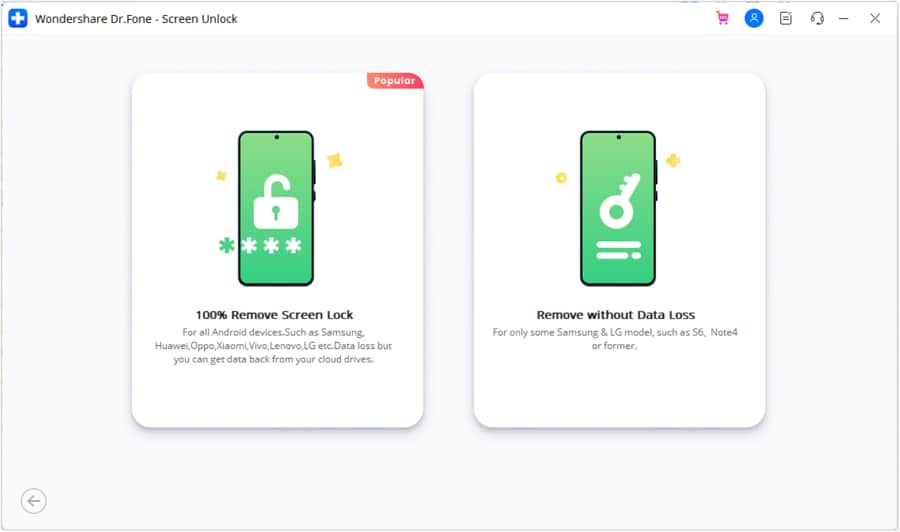
Here you will have some brands to choose from, don’t make it wrong.
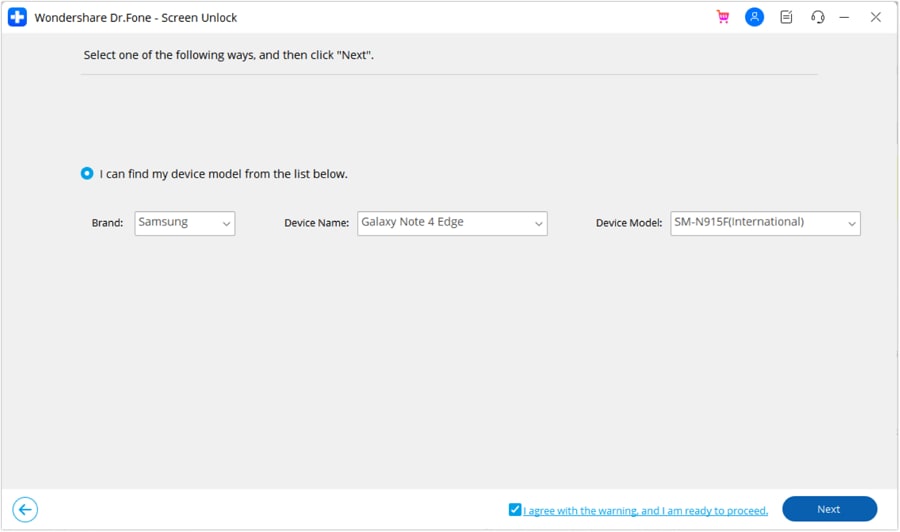
Step 3: Put your device into Recovery Mode.
You will learn how to put your device into Recovery Mode; it’s important to do as instructions, although this part may look a little strange. And there are 3 different Samsung Recovery Modes as examples.
(Get into Recovery Mode in Samsung phone with Bixby)
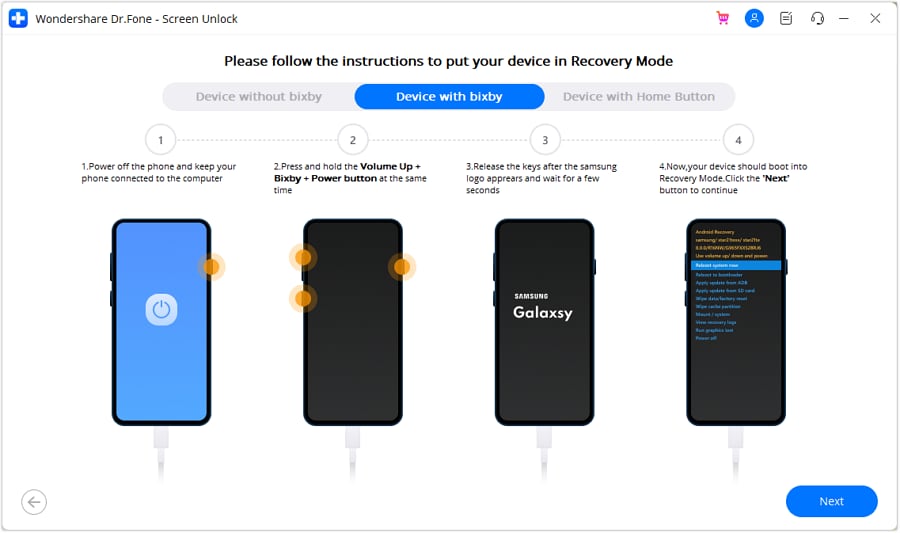
(Get into Recovery Mode in Samsung phone without Bixby)
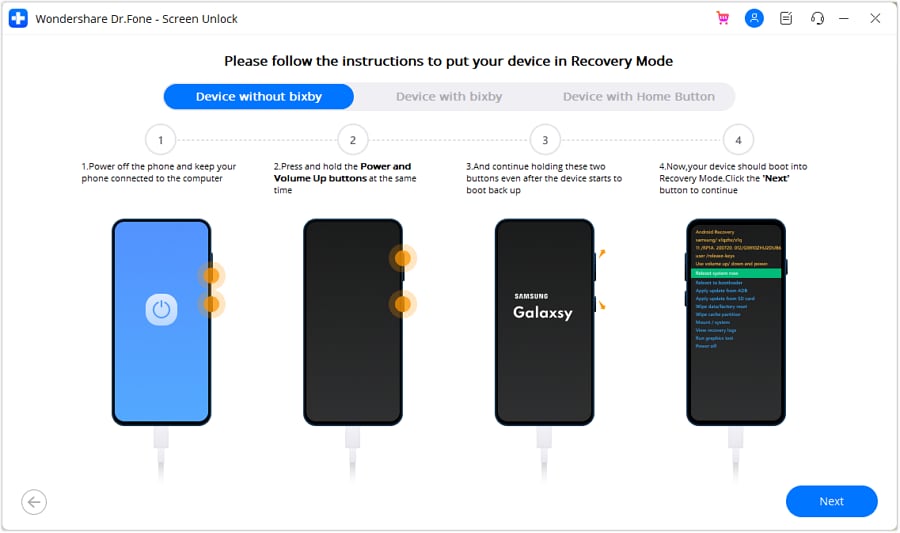
(Get into Recovery Mode in Samsung phone with the Home button)
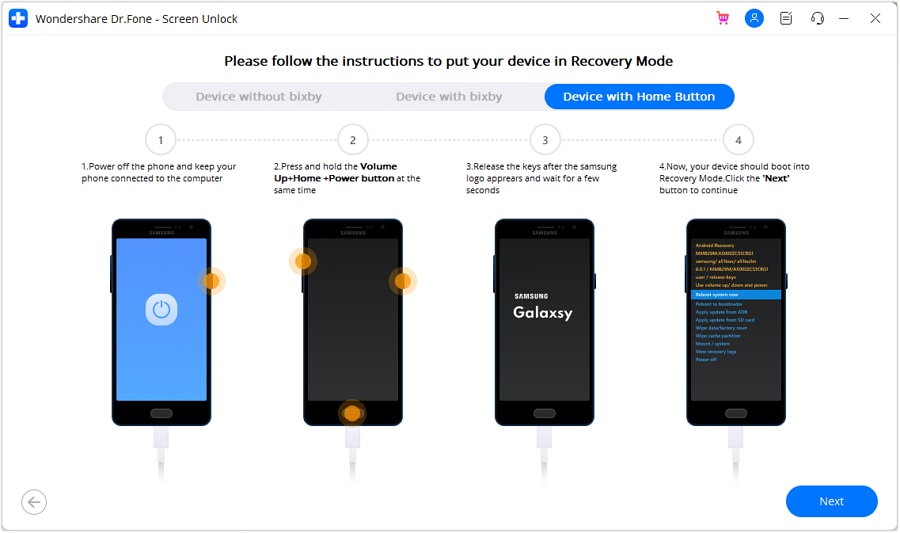
Step 4: Instructions to Wipe Cache Partition
In this part, it is the final but crucial step to unlock your device; if you click any wrong button, your phone may not work anymore.
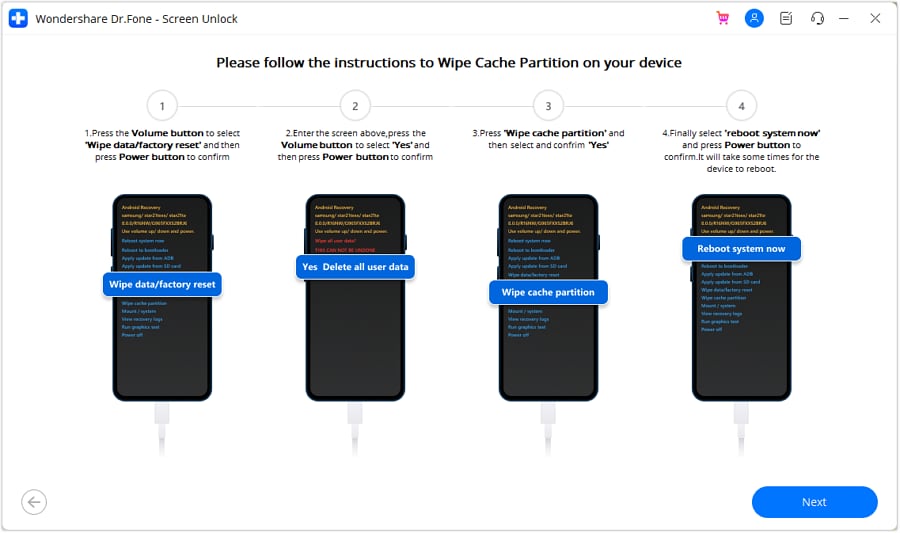
OK, you already passed the unlock process; locks like pattern, password, or fingerprint disappear!
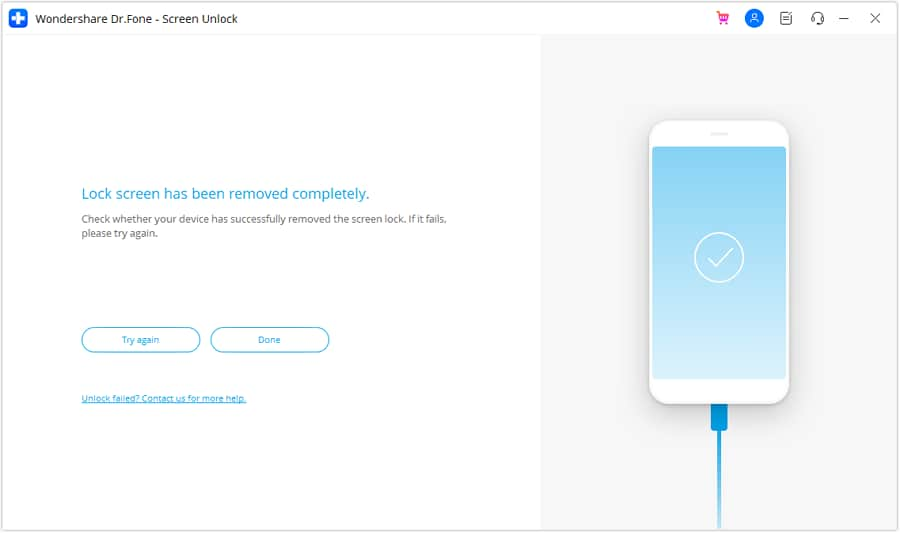
4. Hard Reset your Device
Users of Android smartphones and tablets can troubleshoot various issues with their devices using a feature known as Android Recovery Mode. For example, it might be helpful if you discover that your device is functioning strangely. Recovery Mode Android technically refers to a unique bootable partition with a recovery application installed inside it.
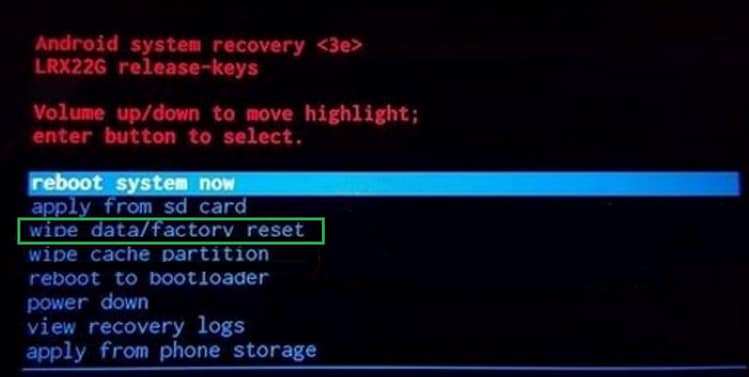
However, users can also use it to reset the android password if it is forgotten. This password also includes fingerprint locks. The instructions for resetting android devices through recovery mode differ for every android device.
5. Google Find My Device
As you are likely aware, every Android device is connected to a Google account. As a result, if you’d like, you may also use it to unlock Android. You’ll need to know your Google account login information for this. When you’re ready, use these instructions to find out how to unlock a phone password.
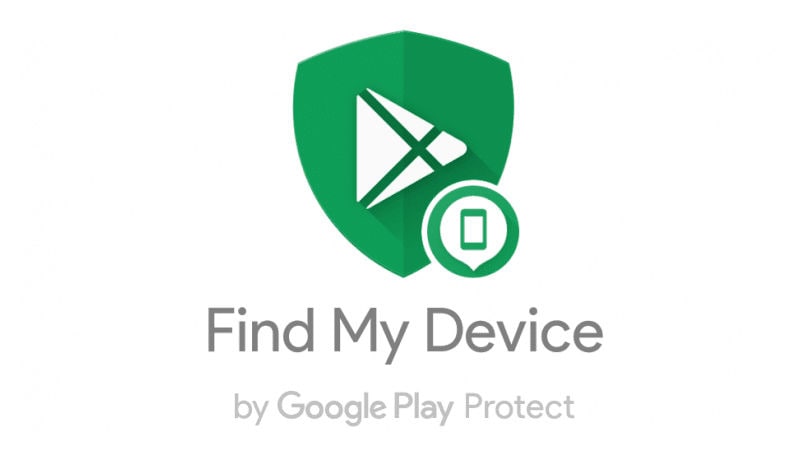
- Login using your Google credentials by going to the official Google Find My Device website.
- You will see the gadgets connected to your Google account as you enter the interface and a map of where they are.
- To wipe the Motorola Moto G23 device, click the ERASE DEVICE option on the left side panel. You will then be required for your password.
- Once more, select “Erase.” This will reset the Motorola Moto G23 device and get rid of the dysfunctional fingerprint lock.
6. Seek Help from Local Dealers
It might be a complicated case if you cannot reset your lock screen fingerprint through the methods described above. In this situation, you need to visit your nearest mobile technician, who can help you restore your device.
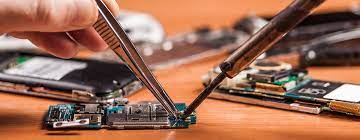
Why does not Fingerprint Work
1. Fingerprint Hardware Module Problems
The fingerprint module should be clean, just like a clean finger is. Unfortunately, the module would collect liquid from your fingers, especially if you had used a moisturizer earlier, making it difficult for the sensor to read your fingers accurately.

Please inspect the fingerprint module for any fluids or debris and clean it with a dry cloth to resolve this. If the dirt is on the module, clean it with wipes or a moist cloth wet with water.
2. Software Update
Another software-related issue that may occur because “ fingerprint sensor not working” issue is a software defect. Try checking if you have a pending update on your device and install it. Moreover, if the problem started after a system update, you may wait for a new update to fix the problem or go back to the previous update.
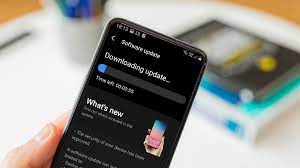
To install an update, open the Settings app, tap on ‘System,’ pick ‘System Update,’ and download and install any pending update.
3. Clean your Screen
If you have a device with under-display fingerprint scanner, you might need to clean the screen properly before using the fingerprint. In some cases, screen protectors also interfere with fingerprint functioning.
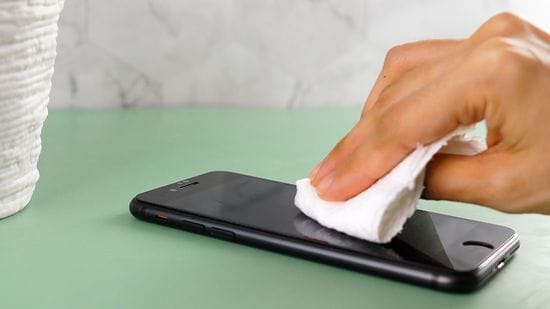
Conclusion
Any method can solve the problems of using your device with your Android handset. The best thing about these solutions is that you don’t need difficult professional skills to complete the tasks. Dr.Fone-Screen Unlock is the easiest way to help your device if you have a password or fingerprint problem.
How To Unlock Any Motorola Moto G23 Phone Password Using Emergency Call
Today, smartphones are an extension of people. Securing them with a PIN, passcode, pattern, fingerprint, or face unlock has become the norm. It’s like putting a digital lock on our private world.
But you have to face it: sometimes, people forget the codes they set to protect their phones or can’t unlock them with their injured fingers or faces. Picture this: you’re staring at your phone screen, trying to recall that password, but it’s not coming to you.
That’s where emergency call bypass is a nifty little trick that can be a lifesaver. In this article, you’ll learn how to unlock any phone password using the emergency call technique. The article will also explore other methods for when your memory fails you. So, read through and never go through this trouble again.
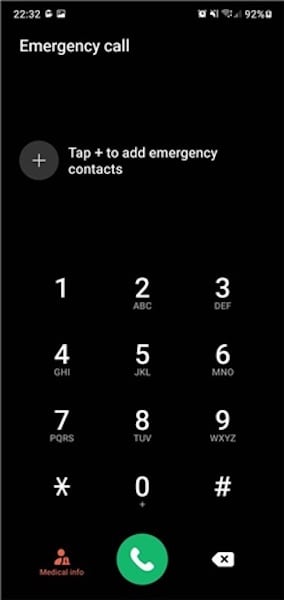
Part 1: What Is the Emergency Call Bypass Method?
The Android emergency call bypass method is a lesser-known workaround for those unfortunate moments when you’re locked out of your phone. This method exploits a loophole in the phone’s lock screen, allowing you to access your device even when you’ve forgotten your password, PIN, or pattern. It’s like finding a secret backdoor when the front door is bolted shut.
“How can unlocking Vivo, Oppo, and Samsung phones using emergency calls be effective?” You may ask. Imagine you need to access important information on your phone but can’t remember your lock screen code. Instead of panicking or rushing to a technician, the emergency call bypass can be a quick and handy solution. It’s particularly useful when immediate access to your phone is crucial and you don’t have time to reset your password through official channels.
Limitations of the Emergency Call Bypass Method
However, it’s important to note that this method has its limitations. It primarily works on older Android devices, specifically those running Android 5.0 (Lollipop) and below. As smartphone technology has evolved, manufacturers have patched many loopholes to enhance security. So, this method might not work for you if you have a more recent Android version.
But don’t worry – if you’re locked out of a newer phone, you can try several other methods, which you will explore later in this article. Remember, the emergency call bypass can be a lifesaver in specific scenarios. However, it’s always best to use such methods responsibly and ethically. And, of course, you should always note your passwords.
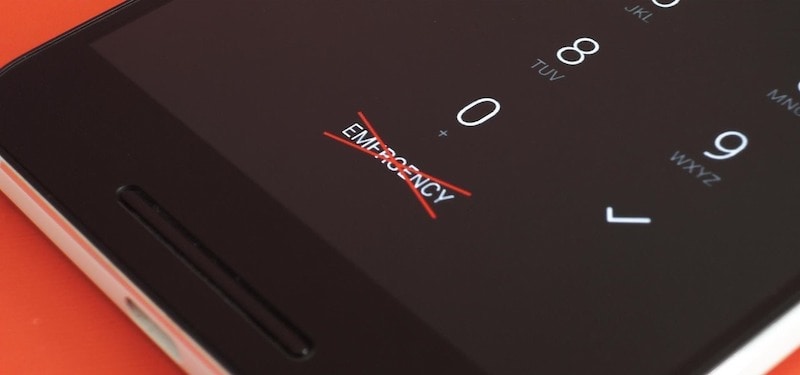
Part 2: How To Perform Emergency Call Bypass To Unlock Screen
Unlocking your Android phone without a password using the Emergency Call Bypass method can be tricky, but it’s doable, especially on devices running Android OS 5.0 (Lollipop) and below. Here’s a step-by-step guide on how to unlock any phone password using the emergency call feature:
- Step 1: Start by tapping the Emergency Call button on your lock screen. This will bring up the emergency dialer screen.
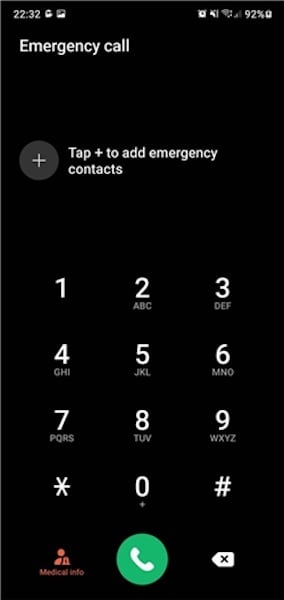
- Step 2: Type a series of special symbols on the dialer screen, such as asterisks (*). Do this several times in a row.
- Step 3: Double-tap the string of symbols to highlight them, then copy the string. Now, tap on the screen to paste the copied string. Repeat this process 10 to 11 times until you can no longer highlight the series.
- Step 4: Go back to the lock screen. Open the Camera app by tapping the camera icon or sliding left. Simultaneously, pull down the Notification Panel from the top.
- Step 5: In the Notification Panel, tap the gear icon to try and access your device’s settings.
- Step 6: When prompted for a password, long-press and paste the copied string into the password field. Repeat this several times until the option to paste is no longer available.
- Step 7: Keep pasting the string until the interface crashes. The lock screen should disappear, and the camera interface will expand. After some time, the camera app should also crash, and your device will unlock, displaying the home screen.
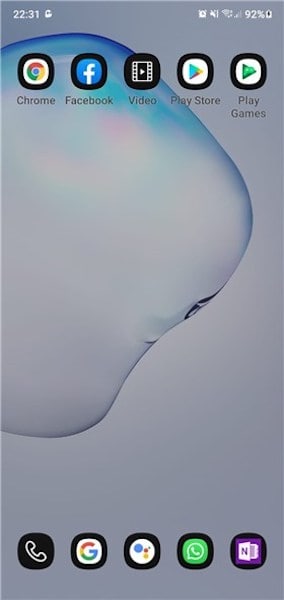
This method, while unconventional, has been known to work on various Android 5 devices, including Samsung models. However, using this technique responsibly and only on devices you own or have permission to access is important. Remember, this method exploits a security flaw and should be used as a last resort.
Part 3: Other Ways To Unlock Your Screen
While the emergency call bypass for Android method is interesting, it’s largely unreliable and outdated, mainly effective on older Android versions. Modern devices have significantly improved security, making this method obsolete. There are other, more reliable methods for those needing to unlock their phone’s screen.
Method 1: Wondershare Dr.Fone – Screen Unlock
Wondershare Dr.Fone is a comprehensive software solution for various mobile issues, including screen unlocking. It’s especially useful when you’ve forgotten your password, pattern, or PIN. Here’s how you can use Dr.Fone to unlock your screen:

Dr.Fone - Screen Unlock (Android)
The Best UnlockJunky Alternative to Bypass FRP and Solve Your Screen Locks
- Completely unlinked from the previous Google account, it won’t be traced or blocked by it anymore.
- Remove all Android screen locks (PIN/pattern/fingerprints/face ID) in minutes.
- Compatiable with various Android models.
- Provide specific removal solutions to promise good success rate.
4,008,670 people have downloaded it
- Step 1: Launch the Dr.Fone toolkit and go to Toolbox > Screen Unlock. Connect your Android device to your PC.

- Step 2: On the next page, choose Android.
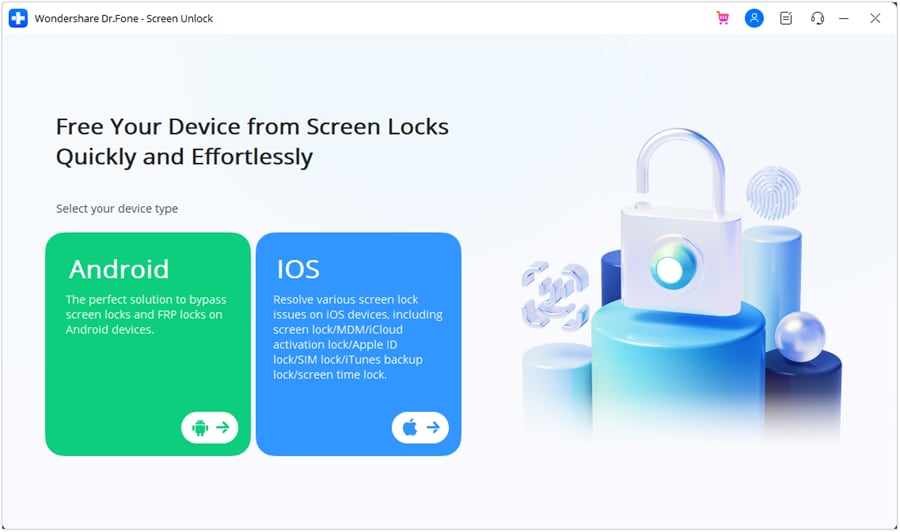
- Step 3: Select Unlock Android Screen, as this is specifically for bypassing the lock screen
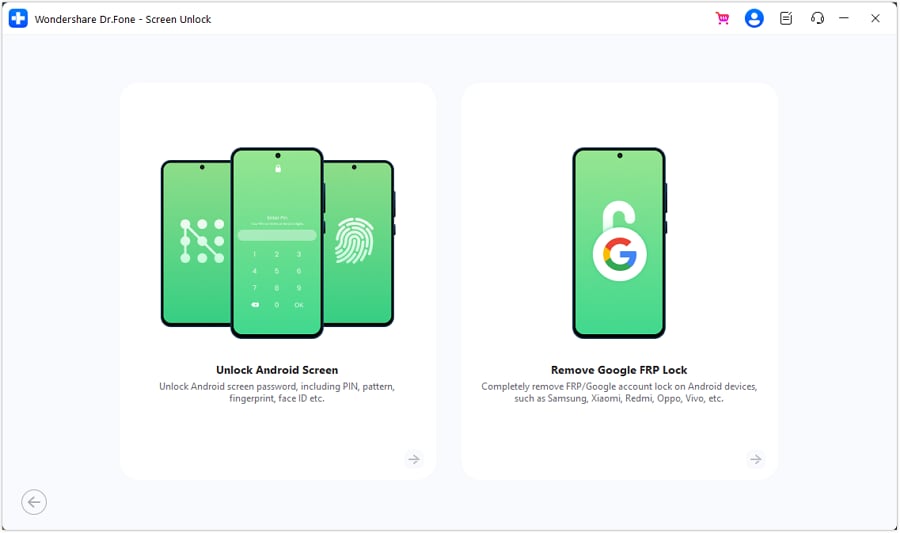
- Step 4: Select the brand of your device.
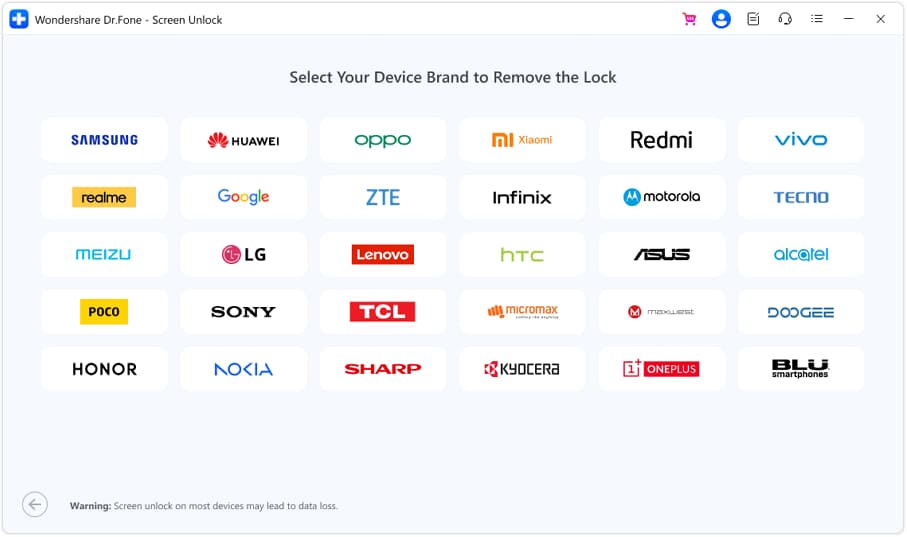
- Step 5: Click Remove without Data Loss to ensure your data stays intact.
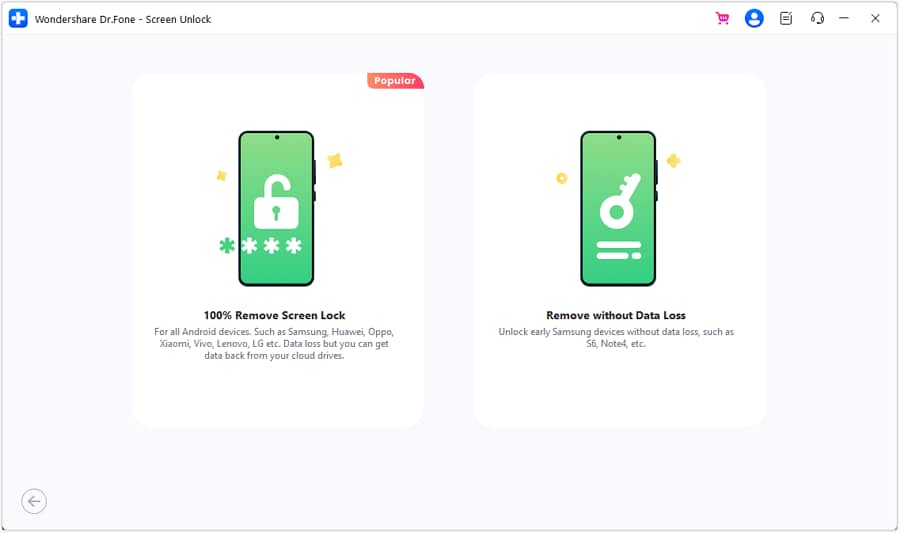
- Step 6: Confirm device details. Then, enter “000000” to confirm and initiate the unlocking process.
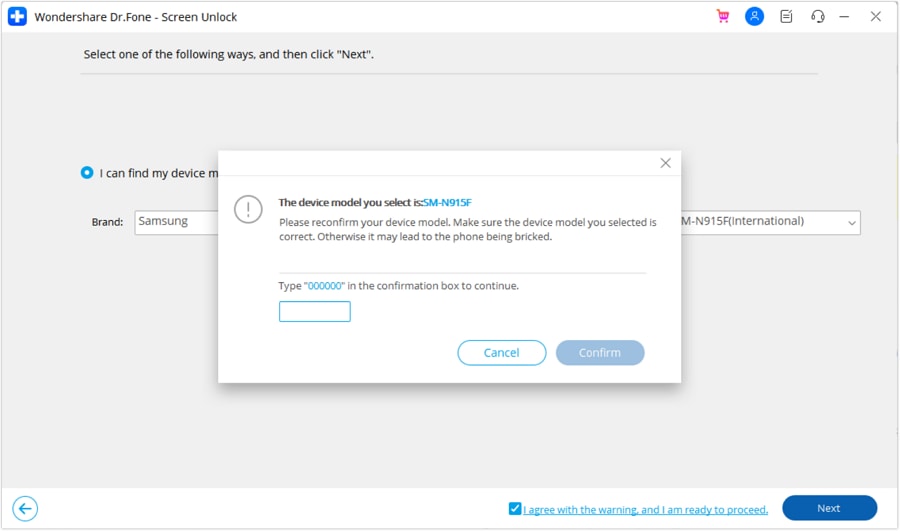
- Step 7: The software will provide specific instructions to put your device into download mode. Follow them.
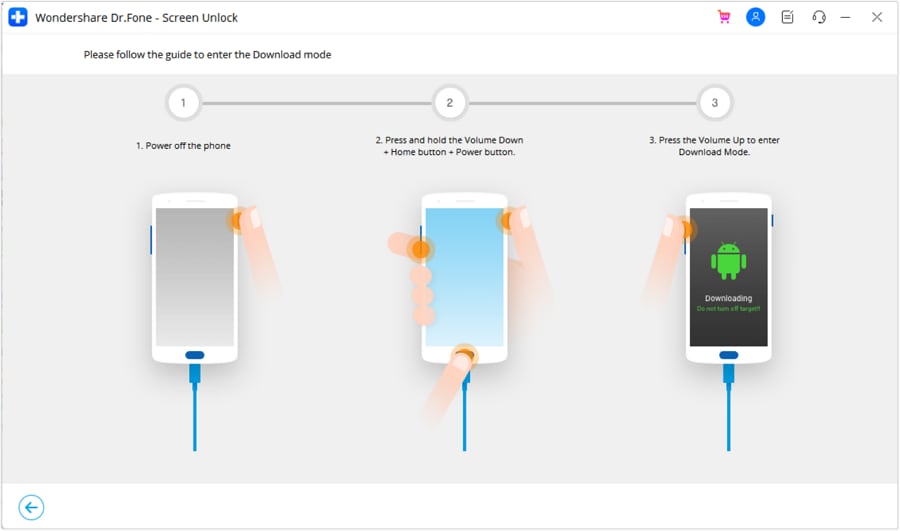
- Step 8: Once the process is complete, click Done. If it doesn’t work the first time, try again.
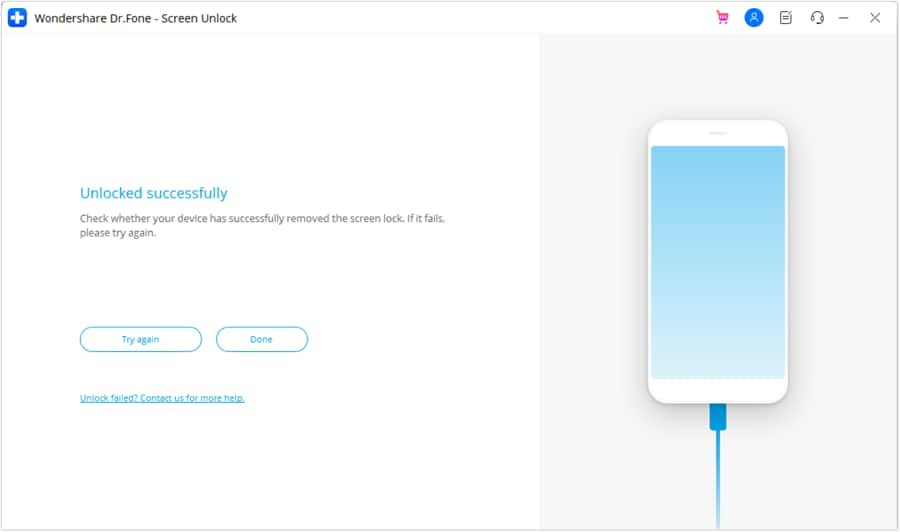
Method 2: Using “Forgot PIN/Passcode” and Google Account
You can use the Forgot PIN/Passcode feature if you’ve linked your phone to a Google account. After multiple failed attempts to unlock your phone, you’ll see a prompt to reset the password via your Google account credentials.
Method 3: Forcing a Data Reset on Your Android Phone
As a last resort, you can perform a factory reset. This will erase all data on your device but remove the lock screen. Access the recovery mode by pressing a combination of keys (usually volume up/down and the power button) and then selecting Wipe data/Factory reset.
Method 4: Booting Into Safe Mode
Booting into safe mode can bypass third-party lock screens. This method won’t work on the default lock screen but can be helpful if an app sets the lock.
In summary, while the emergency call bypass is a thing of the past, there are still various ways to unlock your phone. There’s always a solution, whether through a sophisticated tool like Wondershare Dr.Fone or built-in Android features.
Conclusion
This guide explored how to bypass the Android lock screen using an emergency call. It mainly focused on outdated Android emergency call bypass and more reliable alternatives. Key takeaways include understanding that while older methods like the emergency call bypass are largely ineffective on modern devices, tools like Wondershare Dr.Fone offer a safe and trusted solution.
Learning to unlock your phone screen ensures you’re never locked out of your device, keeping it within your reach. Consider using Dr. Fone- Screen Unlock for a secure and effective way to bypass phone lock screens. It’s an excellent tool for regaining access to your device without risking your data.
A Complete Guide To OEM Unlocking on Motorola Moto G23
Android, known worldwide as a major player in phone operating systems, stands out for its flexibility and open-source nature. This allows users to customize their devices extensively. However, despite this openness, certain features and capabilities can still be locked or restricted, either by Google or the Motorola Moto G23 device manufacturer.
For those looking to truly unleash the full potential of their Android device, an OEM unlock is an essential step. This article will delve into the process of OEM unlocking on Android, guiding you through its benefits and how to safely perform it.
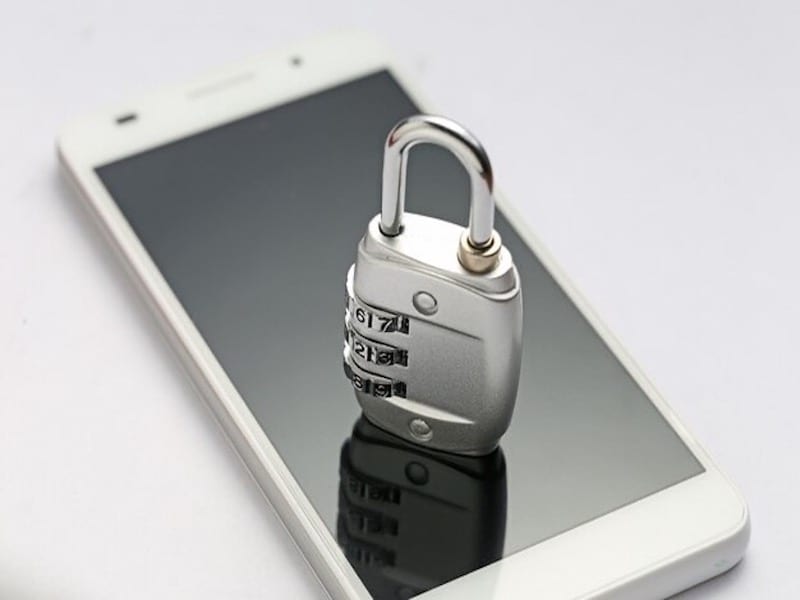
OEM lock might sound like technical jargon to many. However, it’s a key concept for those who wish to dive deeper into Android customization. OEM stands for Original Equipment Manufacturer. Unlocking in this context refers to removing restrictions made by the manufacturer on the Motorola Moto G23 device.
This process allows you to gain deeper access to the Motorola Moto G23 device’s software. Thus, OEM unlocking is often required for customizing or modifying the system at a more advanced level.
Why Enable OEM Unlock?
The primary reason to enable OEM unlocking is to gain the ability to root your device or install custom firmware, also known as ROMs. Rooting is the Android equivalent of jailbreaking. It allows users to access and modify the Motorola Moto G23 device’s software at the deepest level.
This can enable the installation of apps and software that require more permissions than what is typically available. On the other hand, custom ROMs can change your device’s interface. They can also add features not available in the stock version of Android.
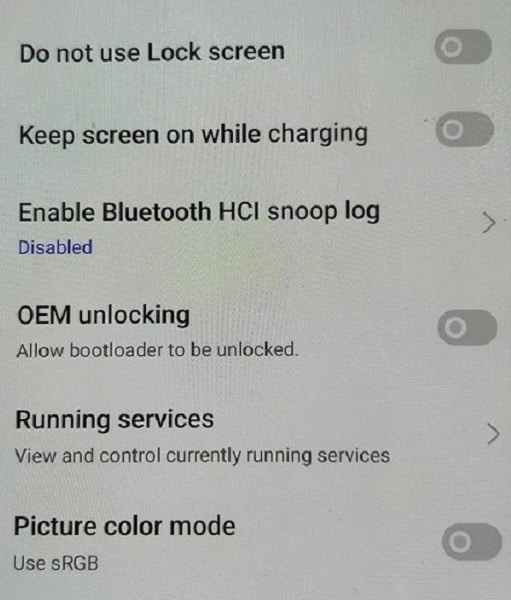
Pros and Cons of OEM Unlocking
Here are some great things you can get when you allow OEM unlock.
- The most significant advantage is the ability to customize your device far beyond what’s possible with standard settings.
- Root access. It allows for rooting the phone enabling advanced features and apps.
- Custom ROMs. Users can install different versions of Android or entirely new operating systems.
On the other hand, here are some cons that you must consider before performing the process on your phone:
- Security risks. Root access can make your device more vulnerable to malware and hacking.
- Void warranty. OEM unlocking often voids the manufacturer’s warranty.
- Potential for bricking. Incorrect procedures can render the Motorola Moto G23 device unusable, known as ‘bricking’.
Understanding the Risks
It’s crucial to understand that OEM unlocking is not without its risks. It does open the door to several customizations and tweaks. However, it can also compromise the security of your device. There’s always a chance of bricking your phone, especially if the unlocking process isn’t followed correctly or an unstable custom ROM is installed.
Additionally, most manufacturers will void your warranty once you unlock the bootloader. This leaves you without support in case something goes wrong. So, in the next sections, you’ll be guided through the steps of OEM unlocking. You’ll also learn how to do it safely, ensuring you make the most out of your Android device.
Part 2: How To Enable OEM Unlock on Your Android Phone
Enabling OEM unlock can feel like stepping into uncharted territory. Still, it’s relatively straightforward if you follow the right steps. Before you start, it’s important to remember that the exact process can vary slightly depending on your device’s brand and model. However, the general steps are usually similar across most Android devices.
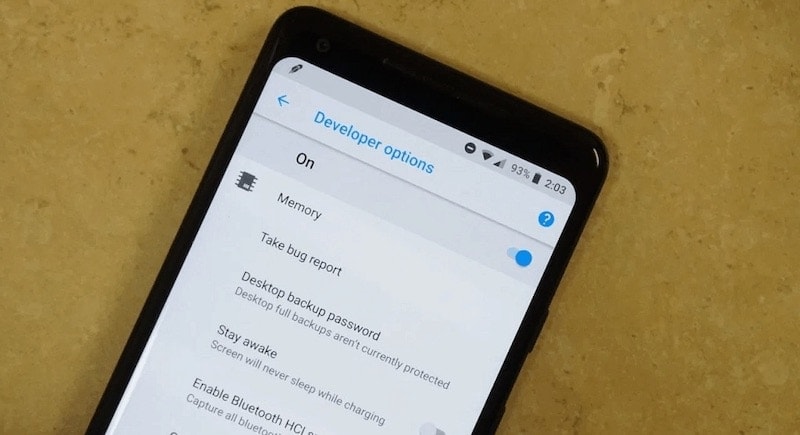
- Step 1: Before proceeding, ensure you back up all important data. Enabling OEM unlock may require a factory reset, which erases all data on the Motorola Moto G23 device.
- Step 2: Go to your phone’s Settings > About Phone. Then, tap on the Build number seven times. You should see a message that says you’re now a developer.
- Step 3: Find and select Developer options on Settings. Then, tap OEM unlocking. You might need to enter a PIN or password.
Here are some common links where you might find the needed PIN or password:
After these steps, your device’s bootloader is now unlocked, and you can proceed with rooting or installing custom ROMs. Remember that this is a significant change to your device’s system, and it should be done cautiously and ideally only if you’re comfortable with potential risks.
Part 3: What Can You Do After OEM Unlock?
Unlocking your phone’s OEM opens up a world of possibilities. It allows you to customize your device beyond what’s available in its factory settings. This newfound freedom, however, comes with its own set of responsibilities and risks. Here’s what you can do after having your phone OEM unlocked.

Root Your Device
Rooting is akin to having the master key to your device’s software. It allows you to gain superuser access, enabling modifications and access to system files that were previously restricted. With rooting, you can:
- Remove pre-installed apps or bloatware.
- Customize system settings and UI elements.
- Enhance performance or battery life through underclocking or overclocking the CPU.
Flash a Custom ROM
A custom ROM is a new operating system you can install on your device. This is one of the most popular reasons for OEM unlocking. Custom ROMs offer:
- The latest Android updates, even for older devices, are no longer supported by manufacturers.
- New features and customization options that aren’t available in the stock ROM.
- Potential performance improvements and unique user interfaces.
Enjoy High Customization
With an OEM unlocked device, the sky’s the limit regarding customization. You can:
- Install custom kernels for better performance and battery life.
- Use powerful apps that require root access for advanced device management.
- Customize everything from the boot animation to the layout of your UI.
However, it’s crucial to proceed with caution. Rooting and installing custom ROMs can void your warranty and, if not done correctly, can turn your device into an expensive paperweight (a state often referred to as “bricking”). Always use reliable sources for your custom ROMs and root-access apps.
Bonus: How To Unlock Your Android Screen When You Forgot Password
Forgetting the password to your Android phone can be a stressful experience. It locks you out of your device. It cuts your access to personal data, contacts, and essential apps. However, aside from OEM unlocking, learning the skill of screen unlocking is incredibly useful in such situations. It’s not just about regaining access. It’s about harnessing control over your device during forgetfulness or emergency.
Wondershare Dr. Fone’s Screen Unlock (Android) will save you in these situations. It’s designed to unlock your phone without requiring a factory reset. It saves your data from being erased. This feature supports unlocking patterns, PINs, passwords, and fingerprints, offering a comprehensive solution for regaining access to your device.

Dr.Fone - Screen Unlock (Android)
The Best UnlockJunky Alternative to Bypass FRP and Solve Your Screen Locks
- Remove all Android screen locks (PIN/pattern/fingerprints/face ID) in minutes.
- Bypass the FRP lock of Samsung without a PIN or Google account.
- Everyone can handle the lock screen without any tech knowledge.
- Provide specific removal solutions to promise good success rate.
4,008,671 people have downloaded it
How To Perform Screen Unlock With Dr.Fone
The process is straightforward. It involves connecting your device to a computer and running the Dr.Fone software. Then, you’ll follow simple on-screen instructions. Learn how to do those below:
- Step 1: Go to Toolbox > Screen Unlock. Connect your Android device with your PC.

- Step 2: Select Android on this page.

- Step 3: Select Unlock Android Screen.

- Step 4: Select your device brand.

- Step 5: Click Remove without Data Loss.

- Step 6: After confirming device details, type “000000” to execute the operation.

- Step 7: Follow the on-screen instructions for putting your device into download mode. Then, wait for the process to finish.

- Step 8: Once complete, click Done. If your device still isn’t accessible, click Try again.

Conclusion
In wrapping up, you’ve explored the ins and outs of “what is OEM unlock” in the Android world. It’s a key to opening up a trove of customizability on your Android device. It lets you tweak and tailor your phone to your heart’s content. But remember, with great power comes great responsibility.
Diving into OEM
Also read:
- [New] Prime Video Communication Experience The Top 10 Mobile Apps
- Comprehensive Guide to M3 Data Recovery Software: Advantages, Drawbacks & Best Alternatives
- Efficient Zoom Functionality for ChromeBooks for 2024
- Fixes for Apps Keep Crashing on Realme 11 Pro+ | Dr.fone
- In 2024, Best Lava Agni 2 5G Pattern Lock Removal Tools Remove Android Pattern Lock Without Losing Data
- In 2024, Can I Bypass a Forgotten Phone Password Of Asus ROG Phone 8 Pro?
- In 2024, How to Reset your Motorola Moto E13 Lock Screen Password
- In 2024, How to Unlock a Network Locked Lava Agni 2 5G Phone?
- In 2024, Pattern Locks Are Unsafe Secure Your Asus ROG Phone 8 Pro Phone Now with These Tips
- In 2024, Remove the Lock Screen Fingerprint Of Your Lava Blaze Curve 5G
- In 2024, Remove the Lock Screen Fingerprint Of Your Sony Xperia 10 V
- In 2024, Universal Unlock Pattern for Asus ROG Phone 7
- In 2024, Unlock Your Asus ROG Phone 8 Pro Phone with Ease The 3 Best Lock Screen Removal Tools
- iSpoofer is not working On Xiaomi 13T Pro? Fixed | Dr.fone
- Lose the Clutter? How to Perform a Clean iPhone Reboot No Backup Required
- Maximizing Video Reach Sharing Twitters' Content on Facebooks
- Resolving 0X80070002 Update Issues on Your PC with Ease
- Streamlining Spotify Listening - Swiftly but Safely for 2024
- The Downsides of Sharing Your YouTube Content via Tube2Gram on Instagram
- Title: Remove the Lock Screen Fingerprint Of Your Motorola Moto G23
- Author: Peter
- Created at : 2024-10-14 18:22:02
- Updated at : 2024-10-19 21:14:38
- Link: https://android-unlock.techidaily.com/remove-the-lock-screen-fingerprint-of-your-motorola-moto-g23-by-drfone-android/
- License: This work is licensed under CC BY-NC-SA 4.0.